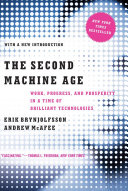

The book discusses how technology has progressed at an unprecedented rate, particularly in the last few decades. The authors, Erik Brynjolfsson and Andrew McAfee, argue that we are in the midst of a second machine age, where digital technologies, especially artificial intelligence (AI) and machine learning, are transforming industries and economies. They explain that the pace of innovation is accelerating due to the interconnectedness of technology, with advancements in one area (like computing power) leading to breakthroughs in others (like data analytics). This exponential growth creates opportunities for businesses and individuals but also poses challenges, particularly in terms of job displacement and the need for new skills. The authors emphasize that understanding this rapid technological change is crucial for navigating the future workforce landscape.
Continue readingBrynjolfsson and McAfee explore how digital technologies are reshaping the economy. They highlight that traditional economic models may not adequately capture the effects of digital innovations, such as the increasing importance of intangible assets like intellectual property and data. The authors argue that digital technologies enable businesses to scale rapidly and reach global markets, leading to increased productivity and economic growth. However, they also point out that this growth is not evenly distributed, with certain sectors and individuals benefiting disproportionately. The digital divide is a significant concern, as those without access to technology or the skills to leverage it may be left behind in the new economy.
Continue readingA central theme of the book is the potential for job displacement due to automation and AI. The authors discuss how machines and algorithms are increasingly capable of performing tasks that were once the domain of humans, leading to fears of widespread unemployment. However, they also argue that while certain jobs may be lost, new opportunities will emerge in fields that require human creativity, emotional intelligence, and complex problem-solving skills. The authors advocate for a proactive approach to workforce development, emphasizing the importance of education and training to equip workers with the skills needed for the jobs of the future. They encourage a societal dialogue about the implications of these changes and the need for policies that support workers in transition.
Continue readingInnovation and entrepreneurship are highlighted as key drivers of economic growth in the second machine age. Brynjolfsson and McAfee emphasize that the barriers to starting a business have decreased significantly due to digital technologies, enabling more individuals to become entrepreneurs. They discuss the importance of fostering a culture of innovation, where experimentation and risk-taking are encouraged. The authors also argue that large corporations must adapt to this new landscape by embracing innovation and collaborating with startups to harness new ideas and technologies. They stress that innovation is not just about technology; it also involves rethinking business models and organizational structures to remain competitive.
Continue readingThe book discusses the growing importance of collaboration and sharing in the digital economy. Brynjolfsson and McAfee highlight how platforms like Uber, Airbnb, and various open-source initiatives demonstrate the power of collaborative consumption and sharing economies. They argue that these models can lead to more efficient resource use and create new economic opportunities. However, the authors also caution that these platforms can disrupt traditional industries and labor markets, necessitating new regulatory frameworks to protect workers and consumers. They advocate for a balanced approach that encourages innovation while ensuring fairness and equity in the sharing economy.
Continue readingAs technological advancements continue to reshape the economy and society, Brynjolfsson and McAfee argue for the necessity of a new social contract. They contend that traditional social safety nets may not be sufficient in addressing the challenges posed by automation and job displacement. The authors call for policies that support workers, such as universal basic income, retraining programs, and improved access to education. They emphasize that society must adapt to the realities of the second machine age by rethinking how we define work, value, and success. This new social contract should promote inclusivity and ensure that the benefits of technological progress are shared broadly.
Continue readingThe authors also delve into the ethical implications of rapidly advancing technologies. They discuss the responsibilities of technologists, businesses, and policymakers in ensuring that technology serves the common good. Issues such as data privacy, algorithmic bias, and the potential for surveillance are examined. Brynjolfsson and McAfee argue that ethical considerations must be integrated into the design and deployment of new technologies to prevent harm and promote equity. They call for a collaborative approach involving diverse stakeholders to address these ethical challenges and create a future where technology enhances human well-being.
Continue readingThe reading time for The Second Machine Age depends on the reader's pace. However, this concise book summary covers the 7 key ideas from The Second Machine Age, allowing you to quickly understand the main concepts, insights, and practical applications in around 23 min.
The Second Machine Age is definitely worth reading. The book covers essential topics including Technological Progress and Its Exponential Growth, The Impact of Digital Technologies on the Economy, Job Displacement and the Future of Work, providing practical insights and actionable advice. Whether you read the full book or our concise summary, The Second Machine Age delivers valuable knowledge that can help you improve your understanding and apply these concepts in your personal or professional life.
The Second Machine Age was written by Andrew Mcafee, Erik Brynjolfsson.
If you enjoyed The Second Machine Age by Andrew Mcafee, Erik Brynjolfsson and want to explore similar topics or deepen your understanding, we highly recommend these related book summaries:
These books cover related themes, complementary concepts, and will help you build upon the knowledge gained from The Second Machine Age. Each of these summaries provides concise insights that can further enhance your understanding and practical application of the ideas presented in The Second Machine Age.